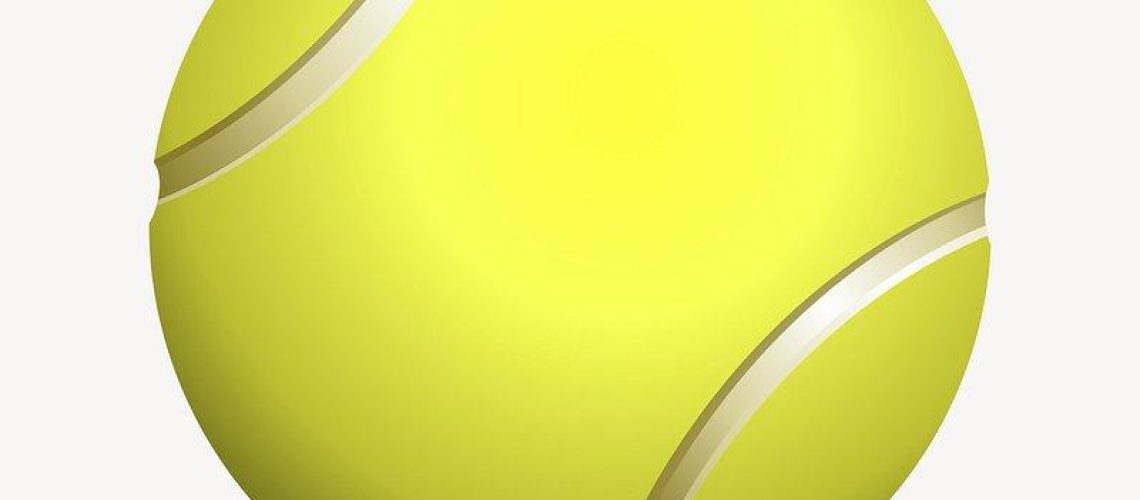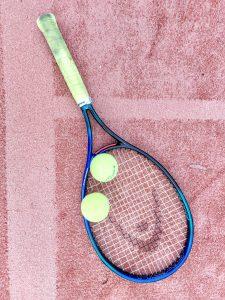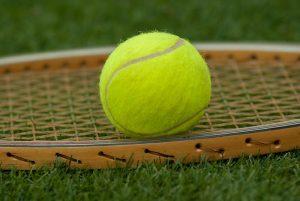We may earn money or products from the companies mentioned in this post.
Brief Overview of Tennis Balls

Tennis balls have a rich history and play an essential role in the sport of tennis These small, fuzzy spheres have come a long way since their inception, evolving to meet the demands of professional players and recreational enthusiasts alike
History and Development
The origins of tennis balls can be traced back to 12th century Europe when they were made from leather filled with hair or wool Over time, the materials used evolved, with rubber becoming the primary component in the late 19th century Today’s modern tennis balls are made from a combination of rubber and a durable felt covering
Importance in the Sport of Tennis
Tennis balls are integral to the game as they directly impact performance and gameplay The unique design and construction of these balls allow for optimal bounce, speed, and control on different court surfaces Professional tennis tournaments carefully select specific brands and models of tennis balls to ensure consistency throughout matches
Purpose of the Blog Post

The aim of this blog post is to delve into the differences between three types of Penn tennis balls: Penn 1, Penn 2, and Penn 3 By exploring their distinct features and characteristics, we hope to provide valuable insights for both avid players seeking top-notch equipment and curious individuals looking to enhance their understanding of tennis ball options
Exploring Differences Between Penn Tennis Balls: Penn 1, Penn 2, and Penn 3
In this section, we will analyze each type individually, highlighting factors such as durability, felt quality, bounce consistency, and overall performance attributes By examining these aspects side by side, it becomes easier to determine which ball suits different playing styles or court conditions best
Addressing Common Questions About These Types
Being well-informed is crucial when making equipment choices, especially in a sport as nuanced as tennis This section aims to address common questions that players may have regarding the differences between Penn 1, Penn 2, and Penn 3 tennis balls We will provide clear answers to help readers make informed decisions and improve their overall game experience
Understanding Tennis Ball Types and Categories

Tennis balls may all look the same at first glance, but there are actually different types and categories that can greatly impact your game By understanding these distinctions, you can choose the right ball for your playing style, court surface, and skill level Let’s explore the various factors that differentiate tennis balls
Regular Duty vs Extra Duty Felt
When it comes to tennis ball felt, there are two main categories: regular duty and extra duty The choice between these two depends on the court surface you’ll be playing on
1
Court Surface Compatibility:
Regular duty felt is best suited for indoor or clay courts as it provides better grip and control on these surfaces Extra duty felt, on the other hand, is designed for hard courts and outdoor play since it offers enhanced durability against the abrasive nature of hard surfaces
2
Durability and Performance:
While regular duty felt may wear out more quickly on hard courts, it offers a softer feel and more spin potential due to its thinner fibers Extra duty felt, with its thicker fibers, lasts longer on hard courts but may sacrifice some spin potential
Pressure-less vs Pressurized Balls
Tennis balls also vary in terms of internal pressure – whether they are pressure-less or pressurized
1
Lifespan and Bounce Consistency:
Pressure-less balls have a solid rubber core that doesn’t rely on internal pressure to maintain their bounce over time They tend to last longer than pressurized balls but may lose their bounce gradually as they wear out
On the other hand, pressurized balls contain gas-filled cores that provide a consistent bounce However, they do lose pressure over time, resulting in a less predictable bounce after extended use
2
Usage Scenarios:
Pressure-less balls are commonly used for practice sessions and training due to their long-lasting nature, making them ideal for drills and repetitive hitting Pressurized balls, with their consistent bounce, are typically reserved for professional play or high-level matches where predictability is crucial
Relationship with Skill Levels – Beginner, Intermediate, Advanced
The choice of tennis ball can also vary depending on your skill level
Beginners:
Beginners often benefit from using larger and softer tennis balls specifically designed for novice players These balls have slower speeds and higher bounce levels, allowing beginners to develop their strokes and improve their control
Intermediate Players:
As players progress to an intermediate level, standard tennis balls become more suitable These balls offer a balance between speed and control that helps players refine their technique and adapt to different playing conditions
Advanced Players:
Advanced players usually prefer using professional-grade tennis balls that meet international standards These balls provide the highest level of performance in terms of speed, spin potential, durability, and consistency
In conclusion..
Examining the Differences Between Penn Tennis Balls: Penn 1, Penn 2, and Penn3

When it comes to tennis balls, not all are created equal Each type has its own unique characteristics that can greatly impact your game In this article, we will delve into the differences between three popular types of Penn tennis balls: Penn 1, Penn 2, and Penn 3 From their technical specifications to performance benefits, we’ll explore what sets them apart
Penn Championship Extra Duty Tennis Balls (Penn1)
The first type we’ll look at is the Penn Championship Extra Duty Tennis Balls, also known as Penn 1 These balls are designed for players who prefer a heavier and more durable ball With a solid construction and high-quality materials, they offer excellent performance on hard courts The extra duty felt ensures longevity even during intense gameplay Whether you’re a professional player or simply enjoy hitting the court with friends, these balls deliver reliable bounce and consistent play
Penn Championship Regular Duty Tennis Balls (Penn2)
If you’re playing on clay or grass courts, the Penn Championship Regular Duty Tennis Balls (Penn 2) might be your go-to choice These balls are specifically engineered for these surfaces and provide optimal performance in terms of bounce and spin control With their regular duty felt construction, they offer just the right amount of grip without compromising durability Whether you’re an aggressive baseliner or a finesse player looking for precision shots, these balls will enhance your game on softer surfaces
Penn Marathon Extra Duty Tennis Balls (Penn3)
Now let’s dive into the unique features of the Penn Marathon Extra Duty Tennis Balls (Penn 3). These balls incorporate innovative technologies to elevate your playing experience One such technology is the LongPlay® Felt, which enhances durability by extending the ball’s lifespan This means you can enjoy more hours of play without worrying about wear and tear Additionally, the Smart Optik® High Visibility Felt offers better color contrast, making it easier to track the ball during fast-paced matches or under varying lighting conditions
When comparing these three types of Penn tennis balls, it’s clear that each one caters to specific player preferences and court surfaces Whether you prioritize durability, precision, or enhanced visibility, there is a Penn tennis ball that suits your needs To summarize the key differences between these balls, refer to the comparison table below:
Comparison Summary
| Tennis Ball | Technical Specifications & Construction Details | Performance Characteristics & Benefits |
|---|---|---|
| Penn 1 (Championship Extra Duty) | Durable construction with extra duty felt for hard courts | Reliable bounce and consistent play; suitable for intense gameplay |
| Penn 2 (Championship Regular Duty) | Grippy felt designed for clay and grass courts | Optimal performance in terms of bounce and spin control; ideal for finesse players |
| Penn 3 (Marathon Extra Duty) | Incorporates LongPlay® Felt technology for extended durability; features Smart Optik® High Visibility Felt for better tracking |
Common Questions About Penn Tennis Balls
How to choose the right ball type based on court surface?
Choosing the right tennis ball can make a world of difference in your game, especially when it comes to the court surface you’re playing on If you’re playing on a hard court, like concrete or asphalt, opt for Penn Championship Extra-Duty balls These balls are specifically designed for hard surfaces, providing durability and bounce that can withstand the harshness of these courts On the other hand, if you’re playing on a clay or grass court, go for Penn Championship Regular-Duty balls These balls have felt that is less abrasive and will not damage the delicate clay or grass surfaces
Is there a significant difference in durability among these three types?
Penn tennis balls are known for their exceptional durability across all three types: Championship Extra-Duty, Championship Regular-Duty, and Pro Penn Marathon The Extra-Duty balls are built to last longer on hard courts due to their thicker felt and reinforced rubber core The Regular-Duty balls have a slightly lighter construction but still offer excellent durability on clay and grass courts As for the Pro Penn Marathon balls, they are designed for professional players who demand maximum longevity from their tennis balls
In what situations should each ball be used?
The choice of tennis ball largely depends on the playing conditions and personal preference For recreational players hitting hard shots on hard courts, using Penn Championship Extra-Duty balls will give them resilience and consistent performance during intense rallies If you prefer a more traditional feel with controlled bounces on softer surfaces like clay or grass courts, then opt for Penn Championship Regular-Duty balls Finally, professional players who require exceptional consistency and durability might find Pro Penn Marathon as their ideal choice
What are other popular alternatives from other brands to Penn 1,2 & 3?
While Penn tennis balls are highly regarded in the tennis community, there are also some other popular alternatives available Wilson Championship tennis balls offer similar features and durability as Penn’s Championship series HEAD ATP and Dunlop Grand Prix balls are also favored by many players for their excellent performance and longevity Ultimately, it is a matter of personal preference and trial-and-error to find the perfect ball that suits your game
How should tennis balls be stored for optimal performance and longevity?
To ensure optimal performance and longevity of your tennis balls, proper storage is crucial One common mistake is storing them in extreme temperatures or direct sunlight, which can negatively affect their bounce and felt quality Instead, store your tennis balls in a cool, dry place away from direct sunlight You can also use airtight containers or cans specifically designed for storing tennis balls to maintain their pressure and prevent moisture absorption By taking these simple steps, you can extend the lifespan of your tennis balls and enjoy consistent performance on the court
Conclusion

In summary, the Penn 1, Penn 2, and Penn 3 tennis balls each offer unique characteristics that cater to different playing styles and court surfaces Understanding the key differences between these ball types can help readers make an informed decision when selecting the right ball for their game
Key Differences
The Penn 1 tennis balls are known for their exceptional durability and longevity They are designed to withstand intense play on hard court surfaces without losing their bounce or felt covering These balls provide a consistent feel and reliable performance throughout extended matches
On the other hand, the Penn 2 tennis balls prioritize enhanced visibility With a vibrant yellow color and extra-duty felt, they are ideal for players who prefer better visibility during fast-paced matches or in low-light conditions The increased visibility of these balls allows players to track the ball’s movement more easily, enhancing their overall gameplay
Lastly, the Penn 3 tennis balls are specifically engineered for clay court surfaces Their unique construction ensures optimal performance on clay courts by providing excellent spin potential and control These balls have a slightly slower pace compared to other ball types, allowing players to execute precise shots with greater accuracy on clay courts
Final Recommendations
When it comes to choosing the right ball type, it is essential to consider your playing style and court surface If you typically play on hard courts or desire long-lasting durability, then opting for Penn 1 tennis balls would be a wise choice
If visibility is crucial for your gameplay or you often find yourself playing in low-light conditions, selecting Penn 2 tennis balls with their vibrant color and enhanced visibility can greatly benefit your game
For those who predominantly play on clay courts or seek improved spin potential and control in their shots, investing in Penn 3 tennis balls will help elevate your performance and game strategy on clay surfaces
Ultimately, the decision between the Penn 1, Penn 2, or Penn 3 tennis balls should be based on individual preferences and specific playing conditions By considering these key differences and recommendations, players can make an informed choice that enhances their overall tennis experience
Useful Links

How to Choose a Tennis Ball
The 7 Best Tennis Balls: Reviews & Buyer’s Guide
Penn Championship Extra Duty Tennis Balls (1 Can, 3 balls)
PENN tennis balls
Why Do Tennis Balls Have Numbers On Them?
4 Best Penn Tennis Balls (2022) – A Complete Guide
Penn® Championship Tennis Balls (3/Can)
Tennis ball
Best Tennis Balls of 2023
Penn Court 1 Recreational Tennis Balls – Regular Duty Felt …
Penn Championship Tennis Balls, 20-pack
Pro Penn Marathon Regular Duty Tennis Balls (1 Can, 3 …
Tennis Balls for sale
Penn Tennis Balls for Sale | Best Price Guarantee at DICK’S
Tennis Balls
A Definitive Guide to The Best Tennis Balls for Every Level
Penn Championship Extra Duty Two Tone Tennis Balls …






